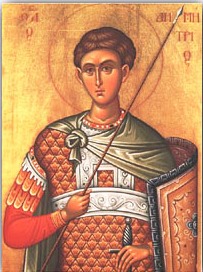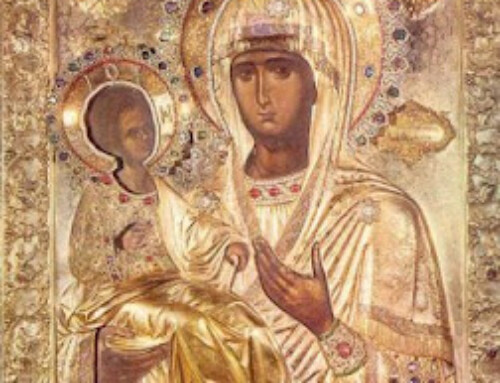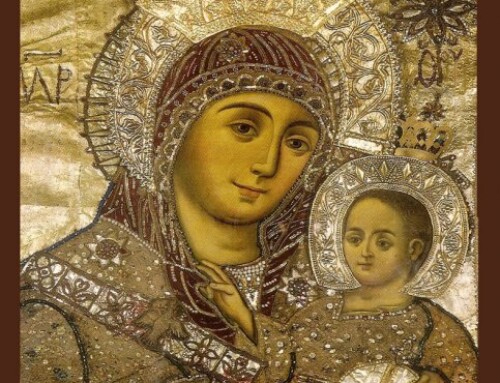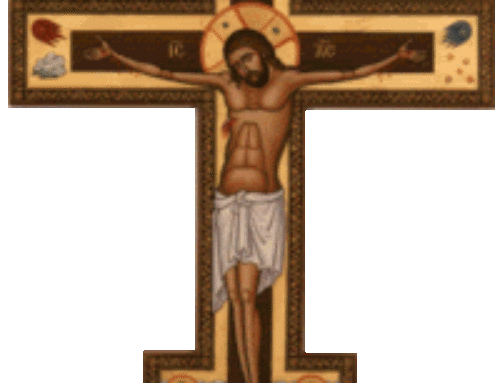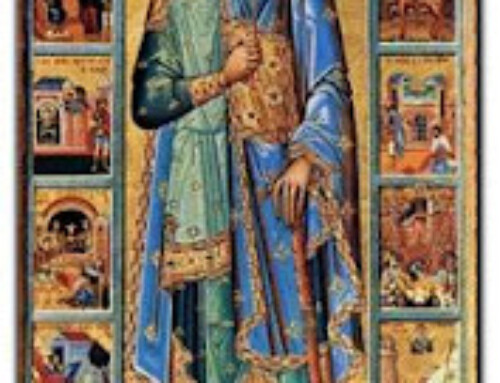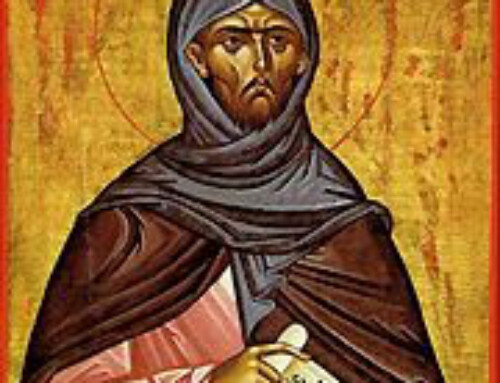The Passion of the Holy, Glorious Great-martyr of Christ, Demetrius
The holy great-martyr Demetrius was born in the city of Salonika and was the son of noble and pious parents. His father was the Military Governor of Salonika and secretly believed in our Lord Jesus Christ and labored for Him. He did not dare, however, to confess the Lord’s most holy name openly, for at that time the impious emperors were tormentors of Christians and had raised up a great persecution against the faithful. Since he feared the threats of the cruel and iniquitous rulers, he hid within himself the pearl of great price, the faith which is in Christ. But in his palace he secretly kept two holy icons, adorned with gold and precious stones, one of our incarnate Saviour and the other of the most holy Theotokos. A lamp always burned before them, and he censed them with incense; and together with his wife, who also believed in Christ, he prayed to the true God, Who dwells in the heavens, to His Only-begotten Son, and to our immaculate Lady. This pious couple was exceedingly merciful to the poor and gave abundant alms to those who asked of them. But they had no children, and this grieved them greatly; therefore, they prayed God fervently that He grant them an heir.
In a short time their prayer was heard, and they were granted a child, the holy and blessed Demetrius. All Salonika rejoiced with its Governor, who had a feast prepared for the entire city and especially for the poor, to thank God for the gift He had bestowed upon them.
When the boy reached an age at which he could know and understand truth, his parents took him into the room where they prayed. They showed him the holy icons and said, “This is the depiction of the one, true God, Who made heaven and earth, and this is the image of the most pure Virgin Theotokos.” They instructed Demetrius in the holy faith and in everything which leads to the knowledge of the Lord Jesus Christ. They explained to him, moreover, how vain are the vile gods of the heathen and their lifeless idols. Through his parents’ teaching and especially through the workings of the grace of God within him, Demetrius came to know the truth. He believed in God with his whole heart, bowed down before the holy icons, and kissed them reverently. After this his parents secretly summoned a priest and certain of the Christians whom they knew, and in their hidden chapel they had their son baptized in the name of the Father, Son, and Holy Spirit.
After the child was baptized, he received instruction in the law of God. As he grew, his understanding was strengthened, and he ascended from rung to rung on the ladder of virtue. The grace of God, which was upon him, enlightened the boy and made him wise. When he had already reached manhood, his parents departed from this temporal life, leaving Saint Demetrius both their possessions and the example of their good deeds.
As soon as the Emperor Maximian2 learned of the repose of the Military Governor, he summoned his son Demetrius. The Emperor perceived that Demetrius was an intelligent and brave man, and so he made him the new Governor of Salonika. He said to the saint, “Protect the city in which you were born and cleanse it of the impious Christians. Put to death all who call upon the name of the Crucified One.”
After he had received the governorship, Saint Demetrius returned to Salonika where he was received with honor by the citizens. Immediately, he began to confess and to glorify the name of our Lord Jesus Christ, and he instructed all the people in the holy faith. He became a second Apostle Paul to the citizens of Salonika, leading them to know the true God and uprooting the ungodliness of polytheism. But within a short time the Emperor Maximian learned that his Governor Demetrius was a Christian and had led many to his faith. When the Emperor heard of this he was enraged. At that time he was returning from a campaign against the Sarmatians, and so he went to Salonika. Before the Emperor reached the city, Demetrius put into the hands of a trusted servant named Lupus all his possessions, the wealth he had inherited from his parents, his gold and silver, precious stones, and raiment. He instructed Lupus to distribute these things quickly to the poor and needy, saying, “Give away my earthly riches and let us seek the wealth of heaven.
Then Demetrius began to pray and to fast, preparing himself to receive the crown of martyrdom. As soon as the Emperor began to make enquiry as to the truth of what was said concerning Demetrius, the saint hastened to appear before him, boldly confessing himself to be a Christian and reviling the polytheism of the pagans. The Emperor then ordered that Demetrius be imprisoned. There the saint prayed in the words of David, 0 God, be attentive unto helping me; 0 Lord, make haste to help me.3 For Thou art my patience, 0 Lord; 0 Lord, Thou art my hope from my youth. On Thee have I been made fast from the womb; from my mother’s womb Thou art my protector. In Thee continually is my singing of praise;4 1 will chant unto my God for as long as I have my being.3 My lips shall rejoice when I chant unto Thee; moreover, my tongue will meditate on Thy righteousness all the day long.6
Saint Demetrius sat in the dungeon chanting unto God and glorifying Him as though he were in a bright chamber. Wishing to frighten him, the devil transformed himself into a scorpion and tried to sting the saint’s foot. But the saint signed himself with the Cross and fearlessly stamped upon the scorpion, while repeating David’s words, Upon the asp and basilisk shalt thou tread, and thou shalt trample upon the lion and dragon.7
As Demetrius was sitting in prison, he was visited by a most brilliant angel, who appeared to him wearing a crown from paradise. The angel said, “Peace be to you, 0 martyr of Christ. Take courage and be strong!”
The saint replied, “I rejoice in the Lord and delight in God my Saviour!”
This vision set afire the saint’s heart with love for God, and he was filled with a fervent desire that his blood be shed for the Lord.
While Demetrius was imprisoned, the Emperor was amusing himself with games in the circus. Now Maximian had a renowned wrestler named Lyaeus, who belonged to the tribe of the Vandals. The Emperor ordered that a high platform be constructed in the arena, and he entertained himself by watching Lyaeus wrestle other brave men and cast them down on spears below. It happened that there was a young man present named Nestor, a Christian known to Saint Demetrius. When Nestor saw how Lyaeus slew many and that he was especially eager to slaughter Christians without mercy, he was set aflame with zeal and wished to contend with the Vandal. He went to Saint Demetrius, who sat in the prison, and told him how the wrestler Lyaeus had killed numerous Christians. He asked the saint’s prayers and his blessing to contest with that pitiless manslayer. Saint Demetrius signed him with the Cross and said, “You shall prevail over Lyaeus and be deemed worthy to suffer for Christ.”
As Nestor hastened to the arena, he cried out in a loud voice, “0 God of Demetrius, help me!”
Nestor then entered into contest with the mighty foe, hurling him to a bitter death on the sharp spears below. The Emperor was grieved greatly by Lyaeus’ death and immediately commanded that the blessed Nestor be beheaded with the sword. But the Emperor could find no consolation in his sorrow and lamented for Lyaeus all that day and through the night. When he learned that Demetrius had blessed Nestor to contend with Lyaeus and to slay him, he ordered that the saint be run through with lances. Since Lyaeus perished when he was cast down upon spears by Saint Nestor, the persecutor desired that Demetrius also be slain with lances. “Let him perish in the same manner as did our champion, whose death he caused,” said the Emperor.
But the senseless persecutor was deceived, supposing that the repose of a saint could be like that of a sinner, for the death of sinners is evil8 while precious in the sight of the Lord is the death of His saints.9
When the twenty-sixth day of October dawned, soldiers entered the prison where they found Saint Demetrius standing at prayer. They pierced him with their lances, and he surrendered his honorable and holy soul into the hands of Christ the Lord, Who was likewise pierced by a spear. His body was cast out and lay upon the ground in dishonor until the faithful came by night, took it secretly, and buried it.
Demetrius’ trusted servant Lupus, who was previously mentioned, was present in the prison when the saint was run through with spears by the soldiers. He dipped his finger in his master’s blood and took his lord’s blood-soaked robe and worked many miracles with that robe and with his finger. He healed every disease and cast out evil spirits, and as a result, word of these marvels spread throughout Salonika, and all who were ill began to come to him. When Maximian learned of this, he commanded that the blessed Lupus be seized and beheaded. Thus did Saint Demetrius’ good servant follow his master unto the Lord, for where the master is, there should his servant be also.
A short time thereafter the persecution ceased, and a little church was built over the grave of Saint Demetrius. Many miracles were worked there and various healings bestowed upon the infirm. Now there was an illustrious nobleman named Leontius, a believer from the land of Illyria, who came with faith to the grave of the holy great-martyr Demetrius. He was suffering from a grievous and incurable illness, but when he was carried into the church and laid on the martyr’s tomb, he immediately received healing. He arose cured and gave thanks to God and His servant, Saint Demetrius.
It was Leontius’ desire to erect a large and beautiful church and to dedicate it to the saint as a token of his gratitude, so the small church was torn down. When the workmen began to dig trenches for the foundation of the new church, they unearthed the relics of the holy great-martyr Demetrius, which were whole and incorrupt. Fragrant myrrh flowed from them, filling the whole city with its scent. All the people gathered together and joyfully removed the saint’s remains from the earth. An innumerable multitude of the sick were healed when they were anointed with the myrrh. Leontius rejoiced greatly not so much on account of his healing as because of the uncovering of the saint’s relics. Soon, the work he had begun was completed, and that most wondrous temple was dedicated to Saint Demetrius. The saint’s holy relics were placed in the church in a coffer plated with gold and silver and adorned with precious stones. Leontius purchased villages and vineyards and gave them to the church for the support of its clergy.
As he was preparing to return to his home, Leontius wished to take a portion of the saint’s relics with him and to build a church dedicated to Saint Demetrius in his homeland. But the saint appeared to him and forbade him to remove any part of his remains; therefore, he took only Demetrius’ shroud, which was soaked in the saint’s blood. Leontius placed it in a golden reliquary and then departed. Through the prayers of the saint, numerous miracles were worked by that cloth as Leontius was travelling. During the course of his journey, it was necessary for Leontius to cross a very wide and swollen river. He was greatly troubled and very fearful until the holy martyr appeared to him and said, “Take the shroud in your hands and do not be afraid.”
Leontius did this, and he and those with him succeeded in crossing the river. When he reached his own country, he built a most magnificent church dedicated to the saint. Marinus, the Eparch of Illyricum, who was covered with sores and pus from head to foot, was delivered from his infirmities when he prayed in this church. A man with an issue of blood was also healed in a wondrous manner, as was a possessed man. Through the saint’s prayers, many other miracles were worked there, but not as many as in Salonika where his holy relics lay.
Once, there was a great famine in Salonika, and the people began to die from lack of food. Unable to bear to see the inhabitants of his city perish from hunger, the saint appeared openly to sailors as he went about various ports, harbors, and islands. He commanded the masters of ships loaded with wheat to sail to Salonika, thus delivering his city from starvation.
When the pious Emperor Justinian built the most splendid and wondrous Church of the Wisdom of God in Constantinople, he sent distinguished men to Salonika to bring a portion of the relics of Saint Demetrius for the consecration of the newly erected church. They reached Salonika and entered the church in which the saint’s revered sepulcher was to be found. However, when they drew near and attempted to fulfill the Emperor’s command, sparks of fire were showered upon them, and they heard a terrifying voice say out of the fire, “Stand back and do not dare to approach!”
All those present fell to the floor in fear. The men took only some earth from the ground near the sepulcher, and they returned to the Emperor. Those who heard report of this were amazed. The men gave to the Emperor half the earth they had taken from near the tomb of the saint, while the remainder was placed in the vestry of the Church of Holy Wisdom.
There was a youth named Onesiphorus whose duty it was to light candles and to trim the lamps in the saint’s church. He succumbed to the temptings of the evil one and began to steal candles and to sell them secretly, keeping the filthy lucre he gained by this for himself. The saint could not permit this evil to continue in his temple, so he appeared to Onesiphorus and compassionately rebuked him for his offense. He said, “Brother Onesiphorus, it does not please me that you steal candles. You wrong those who offer them and harm yourself still more, for judgment awaits those who do such things. Therefore, cease to do this, and repent.”
Onesiphorus awoke from sleep terrified and filled with shame. But some time after this, he forgot the martyr’s admonition and once more began to steal candles without fear. One day, a certain pious citizen of Salonika arose very early in the morning and went to the church. He took with him large candles which he placed before the sepulcher of the holy martyr Demetrius. He lit them, prayed, and departed. Onesiphorus then went to the tomb and stretched forth his hand to take them. Immediately he heard the saint’s voice, which sounded from the grave, “Do you dare to do the same thing again?”
The voice shook Onesiphorus like thunder, and he fell to the ground and lay there like a dead man, stricken with terror, until one of the clerics came and lifted him up. When he came to himself, he confessed before all his sin, explaining how the saint had appeared to him the first time as he slept and had upbraided him the second time while he was awake. All who heard him tell of these things were filled with fear.
The holy great-martyr many times delivered the city of Salonika from barbarian assaults and sieges. Once, during the reign of the Emperor Maurice, an army of Avars attacked and laid close siege to the city. Now there lived in Salonika at that time a certain God-fearing and exceedingly virtuous man named Illustrious. This man went one night to the Church of the Holy Great-martyr Demetrius, where he prayed in the narthex to God and to Christ’s passion-bearer, asking them to defend the city. He fell into a stupor and saw in a vision two radiant youths attired like the bodyguards of an emperor. These were angels of God, for as they entered the saint’s church, the doors opened for them of their own accord. Illustrious followed them to see what they intended to do. When they were inside the church, they said loudly, “Where is the master of this place?”
Then another youth, whose garment was like that of a servant, appeared and asked, “Why do you seek him?”
They replied, “The Lord has sent us to speak with him.”
The servant pointed to the sepulcher of the saint and said, “He is here.”
The two men said to the servant, “Inform him that we have come.”
The servant drew back the curtain, and lo, Saint Demetrius came forth to meet them. His appearance was as it is depicted on icons, but he shone as brilliantly as the sun. Illustrious could not bear to look upon him and began to tremble when he attempted to do so.
After the men kissed Saint Demetrius, he asked them, “I beseech you, tell me why you have come to me.”
They answered, “The Master has sent us to Your Holiness to command you to forsake this city and to come to Him, for He intends to deliver it to its enemies.”
When the saint heard this, he bowed his head in silence and wept. Then the servant said to those men, “Had I known that your coming would bring my master such sorrow, I would not have shown you where he was.”
The saint asked, “Can it be that this is the will of my Lord? Can it be that the Master of all desires that this city, which was redeemed by His precious blood, be delivered into the hands of its enemies, who neither know Him nor believe in Him nor worship His holy name?”
The strangers replied, “If this were not our Master’s will, He would never have sent us to Your Holiness.”
The saint then said, “Return, brethren, to my Master, and tell Him that His servant Demetrius says, ‘0 Lord and Master, we know that Thy pity and love for men are greater than all our sins and that the iniquities of the whole world cannot prevail over Thy compassion. Thou didst shed Thy blood for the sake of sinners and lay down Thy life for them; wherefore, do Thou show mercy upon this city and not compel me to forsake it. Thou hast set me to watch over this city, and since I wish to emulate Thee, my Master, I am ready to lay down my life for its citizens. If these must perish, may I also perish with them! Wherefore, 0 Lord, destroy not the city which calleth upon Thy name. Albeit this people hath sinned, they have not forsaken Thee, Who art the God of those who repent.’
The messengers asked him, “Is this how you wish to reply to the Lord?”
Demetrius answered, “Yes, brethren, for I know that not unto the end will He be angered, neither unto eternity will He be wroth.”10
After saying this, Saint Demetrius returned to his sepulcher, and his grave closed. The men who had conversed with him then departed. Illustrious, who saw and heard all that had occurred, was stricken with terror. After the vision had ended, he came to himself, marvelling greatly. He fell to the ground and thanked the saint for his care for the city and his prayer to the Master that the people not be delivered into the hands of their enemies.
The following morning Illustrious told the people what he had seen, thus strengthening them to battle their foes manfully. All who heard him cried out tearfully to God, begging for mercy. They called upon the help of Saint Demetrius, through whose succor and intercession the city was preserved unharmed. Soon the enemies retired in shame from their positions before the walls of the city, which they were unable to take, preserved as it was by God’s great servant. They returned to their own land without having accomplished anything, for Saint Demetrius did not forsake his city.
Many were the captives whom the saint delivered from bondage. Once, a certain bishop was seized by barbarians and led away in chains. Saint Demetrius appeared, loosed his fetters, and guided him back to Salonika. At another time barbarians attacked the area surrounding Salonika, capturing many of the people who lived outside the city. They took two fair maidens to their country and gave them to their Prince, for the virgins were skilled in needlework and knew well how to embroider every sort of depiction of flowers, trees, birds, beasts, and human faces. When the Prince learned that they knew this craft well, he said to them, “I have heard that the great god Demetrius works wondrous miracles in your land. Embroider his image for me on linen, that I may worship him.”
The virgins said, “Demetrius is not a god but a great servant of God and the helper of Christians. We dare not do what you ask, 0 Prince, for we know that you do not wish to revere Saint Demetrius but to mock him.”
“Your life and death are in my hands,” said the Prince. “Choose whichever you prefer. Do as I command and you shall live. But if you do not obey my order, you shall die.”
Fearing to die, the maidens began to embroider the image of Saint Demetrius upon a cloth. It was completed on the day of the saint’s commemoration. That night, as the maidens sat by their embroidery frame, leaning over the image they had made, they began to weep and to pray, saying, “Be not angered with us, 0 martyr of Christ; we know that the iniquitous Prince desireth to mock thy holy image. We did not wish to portray thy sacred countenance but did so unwillingly, fearing a bitter death.”
As they wept thus, bent over the image, the virgins fell asleep. And lo, as once the angel took Habakkuk to Babylon, so did Saint Demetrius take the virgins and the image they had made to his sepulcher in his church where the All-night Vigil was being served. The people there were amazed when they beheld this wonder, and when the maidens awoke, they cried out, “Glory to God! Where are we?”
The virgins thought they were dreaming, but when they saw the tomb of the saint and the multitude of people standing in the church, they understood that they truly were in Salonika. With a great voice they thanked their intercessor, Saint Demetrius, and before all confessed everything that had happened to them. The people of Salonika were filled with joy by this most wondrous miracle, and they happily celebrated the feast of Saint Demetrius. His embroidered image was placed above the altar, and through it many miracles were worked, unto the glory of God, Who is one in Trinity. Unto Him be honor, thanksgiving, and worship from all creation unto the ages. Amen.
1. From Symeon Metaphrastes and The Great Collection of Readings of the blessed Metropolitan Macarius of Moscow
2. Maximian Hercules
3. Ps. 69
4. Ps. 70
5. Ps. 145
6. Ps. 70
7. Ps. 90
8. Ps. 33
9. Ps. 115
10. Ps. 102

